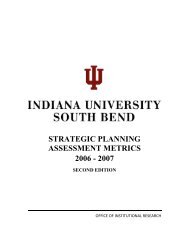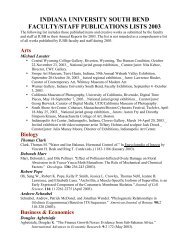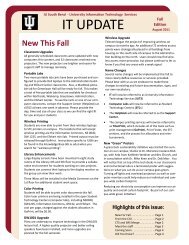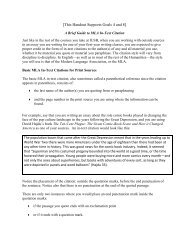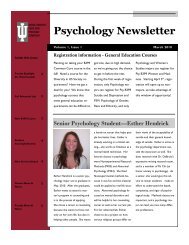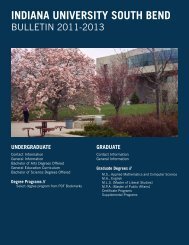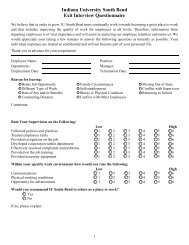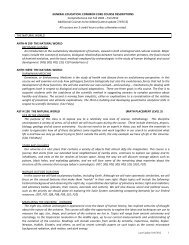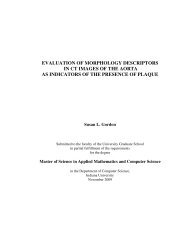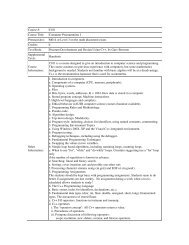Current version - Indiana University South Bend
Current version - Indiana University South Bend
Current version - Indiana University South Bend
You also want an ePaper? Increase the reach of your titles
YUMPU automatically turns print PDFs into web optimized ePapers that Google loves.
3843 IU SOUTH BEND COURSE DESCRIPTIONS<br />
PSY-P 106 General PsychologY–honors (4 cr.)<br />
P: Consent of instructor. Intensive<br />
introduction to psychology, combining<br />
lectures, discussions, and laboratory<br />
demonstrations. May not be taken by<br />
students who have had PSY-P 103 or<br />
PSY-P 101/PSY-P 102. I<br />
PSY-P 190 Applying Psychology (3 cr.)<br />
<strong>Current</strong> theory and applications of<br />
psychology covering personality, social,<br />
learning, cognition, and clinical topics.<br />
Applications of psychology to real-world<br />
problems and issues. Specific topics vary<br />
across semesters.<br />
PSY-P 205 UNDERSTANDING research in<br />
PSYCHOLOGy (3 cr.)<br />
P: PSY-P103 or PSY-P106 and Level 3<br />
on mathematics placement examination.<br />
A combination of experimental research<br />
methods and statistics for non-majors.<br />
This course offers instruction in critical<br />
thinking, different research designs,<br />
execution of simple experiments,<br />
interpretation of statistical outcomes,<br />
and understanding research reports. I, II<br />
PSY-P 211 Methods of Experimental Psychology<br />
(3 cr.)<br />
P: COAS-Q 110, ENG-W 131, and PSY-P<br />
103 or PSY-P 106. Design and execution of<br />
simple experiments, treatment of results,<br />
search of the literature, and preparation<br />
of experimental reports. I, II, S<br />
PSY-P 216 Life Span Developmental Psychology<br />
(3 cr.)<br />
P: PSY-P 103 or PSY-P 106. A survey<br />
course which integrates the basic<br />
concepts of physical, cognitive, and<br />
psychosocial development from the<br />
prenatal period to death. Throughout the<br />
life span, theories, research, and critical<br />
issues in developmental psychology are<br />
explored with consideration of practical<br />
implications. Credit not given for both<br />
PSY-P 216 and PSY-P 316. I, II<br />
PSY-P 220 Drugs and BehavioR (3 cr.)<br />
P: PSY-P 103 or PSY-P 106. An<br />
introduction to drug use and misuse. The<br />
use of psychoactive drugs is considered<br />
from a biopsychosocial perspective. The<br />
effects of drugs on the nervous system and<br />
the behavioral adaptations that support<br />
drug use are reviewed. The therapeutic<br />
uses of drugs to treat mental illness and<br />
programs of drug education/prevention<br />
are considered. I, II<br />
PSY-P 233 Industrial Psychology (3 cr.)<br />
P: PSY-P 103, PSY-P 106, or consent of<br />
instructor. Application of psychological<br />
principles and research techniques to<br />
industrial and personnel problems, including<br />
selection, training, organizational processes,<br />
equipment design, and consumer behavior. I<br />
PSY-P 241 Functional Analysis of Behavior 1 (3 cr.)<br />
P: PSY-P 103 or PSY-P 106. Basic concepts<br />
and procedures in the experimental<br />
analysis and control of behavior. II<br />
PSY-P 303 HEALTH PSYCHOLOGY (3 cr.)<br />
P: PSY-P 103 or PSY-P 106. Focuses on the<br />
role of psychological factors in health and<br />
illness. Modes of intervention covered<br />
include health education/promotion,<br />
risk factor reduction, and behavioral<br />
medicine. Topics include stages of<br />
change theory, medical decision making,<br />
pain management, stress management,<br />
addiction, smoking cessation, weight<br />
control, physician-patient interaction.<br />
PSY-P 316 Psychology of Childhood and<br />
Adolescence (3 cr.)<br />
P: PSY-P 103 or PSY-P 106. Development<br />
of behavior in infancy, childhood, and<br />
youth; factors which influence behavior.<br />
Credit not given for both PSY-P 216 and<br />
PSY-P 316. I, II<br />
PSY-P 319 The Psychology of Personality (3 cr.)<br />
P: PSY-P 103 or PSY-P 106. Theories<br />
of personality: methods and results of<br />
scientific study of personality. Basic<br />
concepts of personality traits and their<br />
measurements, developmental influences,<br />
and problems of integration. I, II<br />
PSY-P 320 Social Psychology (3 cr.)<br />
P: PSY-P 103 or PSY-P 106. The study<br />
of psychological theories and research<br />
dealing with social influence and<br />
social behavior, including topics such<br />
as conformity, person perception,<br />
aggression, attitudes, and group<br />
dynamics. I, II<br />
PSY-P 321 Group Dynamics (3 cr.)<br />
P: PSY-P 103 or PSY-P 106. R: PSY-P 320.<br />
Study of group process, group decision,<br />
group relations, group development, and<br />
interrelations with individuals, other<br />
groups, and larger institutions.<br />
PSY-P 324 Abnormal Psychology (3 cr.)<br />
P: PSY-P 103 or PSY-P 106. A first course<br />
in abnormal psychology, with emphasis<br />
on forms of abnormal behavior, etiology,<br />
development, interpretation, prevention,<br />
and therapy. I, II, S<br />
P = Prerequisite, R = Recommended, C = Concomitant, VT = Variable Title<br />
I = fall semester, II = spring semester, S = summer session(s)



